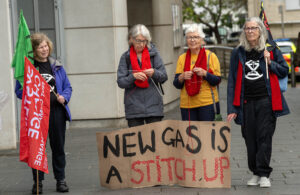Feature: The true cost of your internet search
Environment Journal talks to Sophie Dembinski, UK country manager of search engine Ecosia to find out how to mitigate the environmental impact of our mindless internet searches.
Every time you search for something online it uses an estimated 0.2 grams of carbon dioxide.
To put this into perspective, Google alone receives approximately 2 trillion searches every single year, so that equates to 400,000 tonnes of CO2.
Most of the energy consumed by an internet search comes from the data centres.
Data centres are buildings used to house computer systems, such as telecommunications and storage systems. Every part of a data centre operation consumes electricity. Servers have to be run and maintained, data has to be backed up continually, and the building has to be kept cool to keep every server running smoothly.
If you combine all of these outgoings, a data centre consumes between 10 and 50 times more energy per square foot than a typical commercial building.
However, there is one way to neutralise the carbon footprint of your mindless internet searches, and that is by switching to Ecosia.
Ecosia is a search engine that is completely carbon neutral and invests all of its profits into climate-related projects.
Sophie told Environment Journal: ‘We are 200% renewable, we put twice the amount of energy back into the electricity grid than we use.
‘Our own solar panels produce enough energy to compensate for all of our in-house energy and all of the searches that take place on Ecosia.’
Ecosia makes its money from adverts, every time a user clicks on an ad, they take a small portion of this money.
‘Ecosia is a non-profit organisation, meaning that 100% of our profits go into fighting climate change,’ said Sophie.
‘Around 80% of the profits are spent directly on tree planting projects all around the world. We currently have 31 ongoing projects in 29 countries and in July we planted 100 million trees.’
Their work isn’t limited to just planting trees at random, but they have a full team of ecologists and reforestation experts who work with local communities to identify biodiversity hotspots where trees are needed the most.
‘We never plant monocultures’ said Sophie.
‘We take time to understand which species of trees are needed in each area, what is native.’
Once the trees are planted, Ecosia then monitors them for three years using satellite data, geotagging and pictures.
‘We are all about story-telling, we want to tell people about our projects so they can see where the money is going.
‘There’s a whole process to ensure that we are selecting the right partners in the right places to make sure the trees have the biggest impact.’
However, their mission has not been met without difficulties.
In 2018, the European Union fined Google £3.8bn because it required smartphone users to pre-install Google’s search and browser apps on all Android devices.
One of the remedies of this was that google was told to do more to open up competition on their android devices.
So to allow competition, Google came up with a ‘choice screen’ – where users have the option to select a different search engine.
However, in order for Ecosia to be listed as one of these options, they have to pay Google.
‘We think it’s ridiculous, especially seeing as it’s meant to be a punishment by the EU,’ said Sophie.
‘We are a non-profit organisation, anything we spend not on trees is taking us away from our mission and what our users want.
‘We are really conscious of where we put our money and if it’s not for fighting climate change it is something we will really think about.’
In every possible way, Ecosia is the opposite of what a tech company is ‘supposed’ to look like.
But they are a shining example of what is possible when the motivations are in the right place.
‘People often think we are too good to be true, but we don’t want to stand by and watch as the world goes up in flames around us.’
Photo Credit – Pixabay















